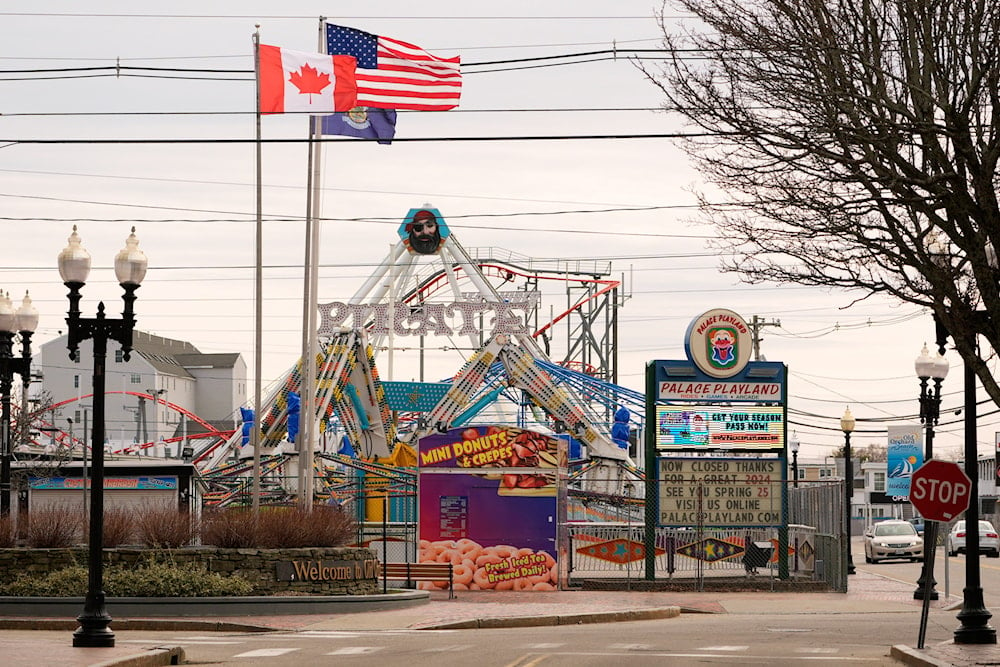Canada heads to polls as Carney leads against Trump-fueled tension
Canada votes amid US tensions, with Mark Carney leading against Pierre Poilievre. =
-

American and Canadian flags fly near the Palace Playland amusement park, on Wednesday, April 2, 2025, in Old Orchard Beach, Maine. (AP)
Canada will head to the polls Monday after a campaign energized by US President Donald Trump's threats, with Prime Minister Mark Carney positioned as the frontrunner after assuring voters that his experience makes him the best choice to confront the United States.
On January 6, the same day former Prime Minister Justin Trudeau revealed his decision to step down, polls showed his Liberal Party lagging behind the Conservatives by over 20 points, with Tory leader Pierre Poilievre appearing poised to become Canada’s next leader.
In the weeks that followed, as Trump unpredictably escalated his trade war while casually floating the idea of annexing Canada. Public fury grew, with Canadians jeering the US anthem at hockey games and canceling cross-border trips in protest.
A win for Carney's Liberals would represent one of the most remarkable comebacks ever seen in Canadian politics.
Poilievre focusing on grievances against Liberals
When Carney took over from the unpopular Trudeau on March 14, he centered his campaign on confronting the Trump threat, warning that the US aimed to "break Canada so they could own us."
The 60-year-old, lacking political office experience but having steered both Canada's and Britain's central banks, convinced voters his international economic expertise uniquely positioned him to shield Canada from Trump's unpredictable trade war.
"Pierre Poilievre has no plan to stand up to President Trump," Carney proclaimed on Friday, adding that "Unlike Pierre Poilievre, I've managed budgets before. I've managed economies before, I've managed crises before. This is a time for experience, not experiments."
The upheaval from Trump’s influence and Trudeau’s replacement with Carney rattled Poilievre, a 45-year-old political veteran with 20 years in Parliament, yet the Conservative leader has worked to refocus the debate on longstanding grievances against the Liberals, especially soaring living costs that fueled discontent during Trudeau’s decade-long tenure.
"The trajectory we are on after this lost Liberal decade, were it to continue, would lead to more despair," Poilievre said on Thursday.
He criticized US President Donald Trump for his policy toward Canada, however, he blamed the weak Canadian economy under the Liberals' rule for leaving the Great White North vulnerable to its southern neighbor's protectionist policy.
Analysts suggest his combative approach, particularly his reliance on fiery partisan rhetoric, has alienated potential Conservative supporters, especially female voters, who might otherwise have backed his party.
Tight race
While polls still favor a Liberal victory, the race has narrowed significantly in the closing stretch, with the CBC poll aggregator showing the Liberals' seven-to-eight point national lead shrinking to 42% support against the Conservatives' 38% by Friday.
The Liberals may gain a critical advantage from the declining support for both the left-leaning New Democrats and Quebec's separatist Bloc Québécois. Previous election cycles have seen these parties siphon enough votes in Ontario and Quebec to prevent the Liberals from securing decisive seat advantages.
Canada's Easter weekend advance polls shattered records as 7.3 million voters, representing one in four of the country's 28.9 million eligible electors, participated in early voting, marking a dramatic 25% surge from 2021's advanced turnout figures while signaling heightened engagement in this pivotal election.
McGill University's Daniel Beland told AFP that Conservative attempts to shift the campaign narrative away from Trump-related issues have proven largely ineffective.
This assessment echoed by political analyst Tim Powers, who noted this election has unfolded far differently than what Tory strategists had originally planned, with both analyses suggesting the Conservatives struggled to control the political agenda when faced with unexpected external pressures.
Powers noted the Conservatives had anticipated a campaign focused squarely on affordability issues, where they held strong messaging advantages, with Poilievre expecting to square off directly against Justin Trudeau as his primary opponent.
Yet he described the race as unfolding unpredictably, forcing the Tories to pivot toward a last-minute mobilization effort to energize their base before Monday’s vote, though results should become clear shortly after polling stations close.

 4 Min Read
4 Min Read








